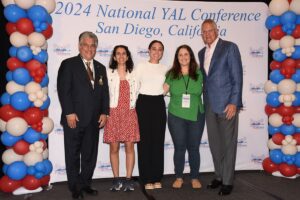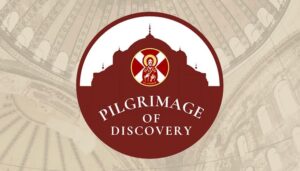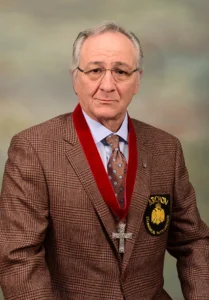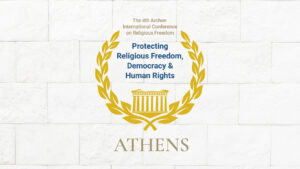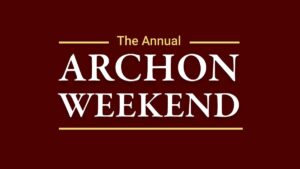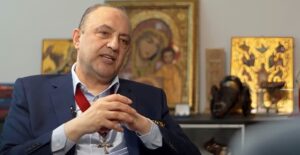In a speech at the Greek Teachers’ Conference, held at the Zografeion Lyceum inIstanbul, His All-Holiness referred to the initiatives of the Holy Church of Christ to raise the awareness of the world community about the need to protect creation and, in particular, the natural environment.
The Ecumenical Patriarch Bartholomew pointed out the importance of the cooperation of all for the protection of the natural environment in a speech he made on Friday, February 22, 2019 at the launch of the Conference “Environment, School, Society – 10 Years of Environmental Actions,” held at the Zografeion Lyceum in Istanbul, attended by more than two hundred Greek teachers. The Conference was organized by the Environmental Education Office of the Secondary Education Directorate of Western Thessaloniki, with the collaboration of the High School Lyceum of Istanbul and numerous educational and ecclesiastical institutions from Greece.
“We are proud because the Holy Great Church of Christ will continue in this age to be the first Church, which has highlighted the spiritual and moral dimension of the ecological problem and the ecological potential of the Christian faith. It is important to emphasize that the concern of the Ecumenical Patriarchate for the natural environment has not emerged from the contemporary ecological crisis. This crisis was the occasion and opportunity for the promotion of the ecological principles and values of Orthodoxy. The very life of the Church is an applied ecology, a true respect for the environment. The ecumenical and ascetic ethos, the simplification of life, the civilization of the person and love dominate here,” the Ecumenical Patriarch pointed out, referring to the innumerable initiatives taken by the first Church of Orthodoxy to raise the environmental issue after a monumental encyclical issued 30 years ago, in which the ecclesiastical New Year’s Day, September 1, was proclaimed ‘The Day of Environmental Protection.’
“The environmental initiatives of the Ecumenical Patriarchate have prompted a global dialogue on the environment, and have inspired parliaments, organizations, and researchers from the wider world of science to address ecological problems. We have been addressing not only Orthodox believers, nor only Christians or believers of other religions, but every person of good will, expressing our confidence in the responsibility of every human being, and holding high hopes for the possible contribution of all. We consider it a particularly important fact that the new generation responds to our invitations. Young people struggle with zeal to protect planet Earth in its function as a real ‘house’ of the human race and of life in general, in order to live the hope of an ecological future for all creation.
“From the outset, I have stressed the relevance of environmental and social problems. We have demonstrated the social dimensions and consequences of the ecological crisis for humanity, and above all for the poor and the needy. The predominant model of economic growth, which serves the profit motive and offers short-term benefit, now exacerbates environmental problems, and works against social cohesion and the true interests of mankind. And the tremendous progress of science and technology goes hand-in-hand with titanism and mankind’s sense of superiority over nature, and with faith in the omnipotence of science. The mixture of economics and science becomes more explosive because it is also associated with the diffusion of individual and social prosperity, and the unnecessary needs of man the consumer.
“It is characteristic of the deadlock and the division of modern man that even in this global economic and social crisis, many of our fellow human beings dream of the ‘paradise’ of consumer welfare instead of struggling for the establishment of a social and ecological culture.
“In our view, the protection of the natural environment and respect for our fellow man are two sides of the same coin. It is inconceivable that one could be sincerely interested in man and to destroy his home, and vice versa. The path to the future can only be ecological and social. The future belongs to the respect for and protection of creation and to the vision of life as a society and solidarity. It is not possible to speak of progress when the environment is destroyed and human nature is tampered with.”
In his address, the Ecumenical Patriarch underlined the important role of the educational community and the importance of the ecological orientation that education should have as a whole.
“Education refers to human freedom, its development and its movement toward the good. By addressing members of the educational community, we do not consider it necessary to say much about education and pedagogy, about the crucial importance of education in dealing with major contemporary problems. It is obvious that education must have an ecophilic orientation and instill ecological sensitivity, responsibility and care for the natural environment in the souls of children and young people. The destruction of nature begins within man’s mind, and there must be treatment for this.
“If the ecological perspective is a basic dimension of education, and if care for the natural environment is, as has already been said, at the center of the Orthodox ethos, religious education in school can and must function as a space of cultivation of ecological responsibility and respect for creation. We call upon all of you to support the teaching of religion and of this important function. You educators manage childhood and adolescence, during which the work of education is rich, and you lay the foundations for the character and the merit of the orientation of man. You have, dear educators and teachers, a great responsibility for the education of the new generation, for the development of a sense of the sanctity of creation. In this holy mission, you have to capitalize upon the value and ecological potential of our Orthodox Tradition.”
To address the various contemporary problems and to protect the natural environment, the Ecumenical Patriarch stressed that it is not enough to cooperate with and mobilize all social forces, but in particular, a radical change of attitude and the development of a new moral responsibility is needed.
“Modern ecological problems are a dimension of the crisis of a culture that is economy-centric, technocratic, individualistic, and arrogant, a culture of quantitative criteria and numbers, profit and consumption, hedonism and unbound freedom. The destruction of the environment is the result of a specific choice of economic, technological and social development, which disregards both the human person and nature. For the first time in history, man can destroy life on earth. Nuclear weapons are the paradigm of the pretentious titanism of modern humans. In view of the fact that today we are going to exceed natural limits, the idea of the “measure” – the “best measure” of the ancients – acquires unprecedented timeliness and value. As science penetrates into the depths of the mystery of life and we will manipulate that mystery, the greater will become our responsibility for its protection.
“Obviously, coping with complex and multifaceted contemporary problems requires multifaceted action, political decisions and administrative measures, the mobilization of civil society, and, above all, a radical change in our mentality, and the development of a new moral responsibility. Protecting the natural environment, this common good, is a shared responsibility of all the inhabitants of the earth. Orthodox Christians are the inheritors of a great and honorable tradition, which originated, developed and preserved high values that are among the most precious elements of the world’s spiritual culture. At the top of this scale of values lies the protection of the human person and his world, the ‘good creation’ of God.”
His All-Holiness congratulated the organizers of the Conference and earlier expressed his particular pleasure that the purpose of these efforts was “to work with the teachers and students of our Greek schools on environmental education, sustainability and sustainable development, as well as the promotion of the importance of information, the exchange of views, and awareness of the social impact of the environmental crisis, as well as the value of ecological orientation for modern humans.”
“We particularly appreciate dialogue, face-to-face meetings, the exchange of views, the undertaking of concrete joint initiatives, mutual understanding and mutual trust. Lively personal communication is vital in the age of information and the Internet and the exhaustion of the person in the vast cyberspace. We do not reject digital communication, but we call upon you not to let machines substitute for personal relationships, the joy of gathering and dialogue, closeness and the inspiration created by living society. Technology facilitates communication, but it does not favor relationships or human society. It has been rightly said that “the machine cannot be our legislator.”
Watch a video of His All-Holiness’ speech in Greek on the Ecumenical Patriarchate’s Facebook page.

